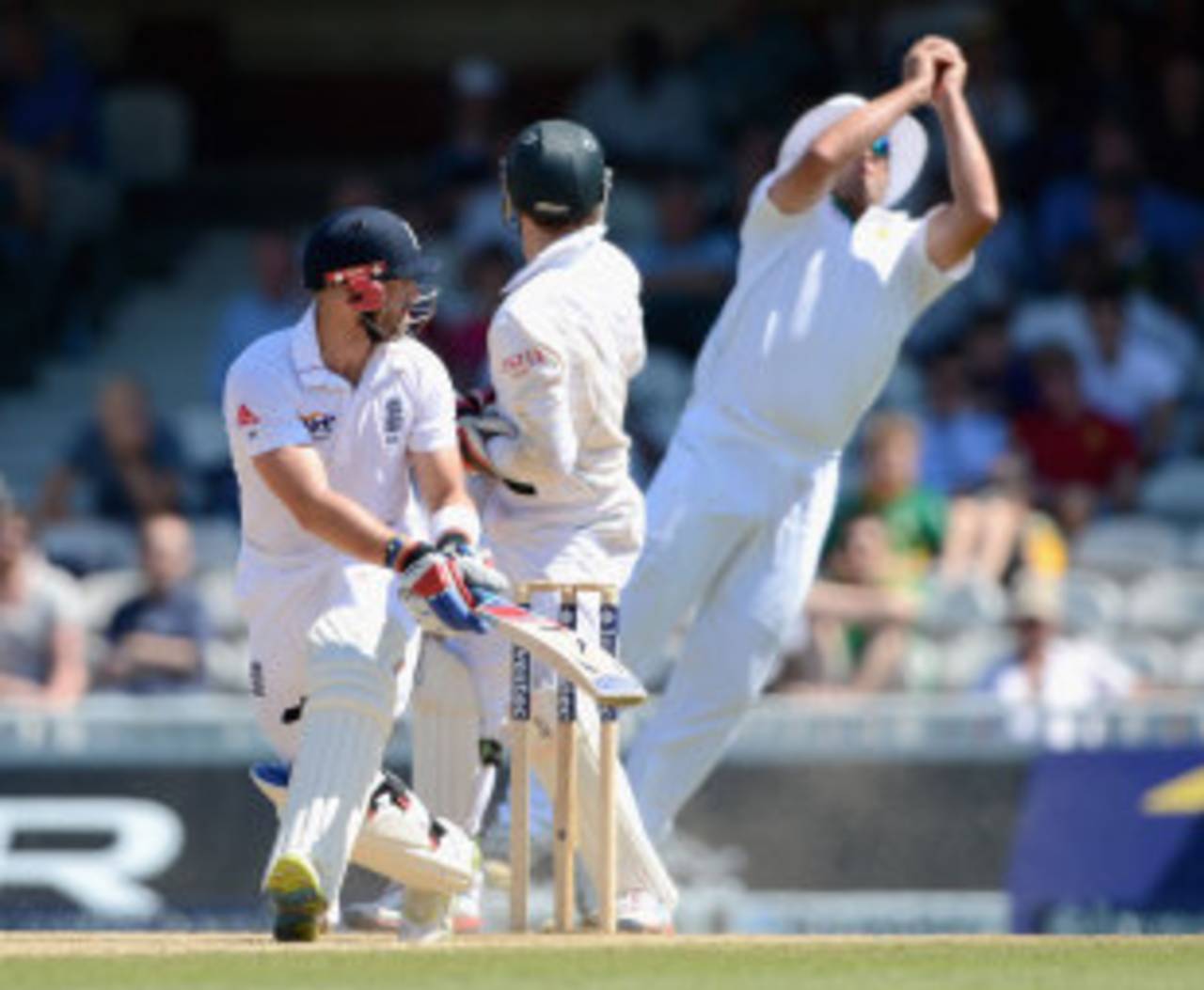England limitations exposed
Technical deficiencies on slow, dry pitches mean England have now lost five from nine
Mark Nicholas at The Oval
Jul 23, 2012, 9:54 PM

Matt Prior fell trying to combat the unorthodoxies of Imran Tahir's legspin • Getty Images
Let's talk about England. A consistent batting group were given first use of a good pitch and cocked it up. A celebrated bowling attack took two wickets during a match that lasted almost five days. The opposition took 20 wickets and made more than 600 runs. There you go. Like the story of World War Two, you can tell it on the back of a cigarette packet if you have to.
England are not half the team if the pitch is dry and slow. Dry with pace, fine. Slow with seam movement, fine. Dry and slow, big question mark. Five out of nine Tests lost this year, all on dry and slow surfaces. The whisper before the match was that England were after something that spins, backing Graeme Swann against Imran Tahir and figuring everyone else would cancel themselves out. During the match this whisper did a splendid u-turn and became England asking for, but not getting, a pitch with pace that offered some lateral movement to seam bowling. I am inclined to run with the first of these, manly because it makes some sense and worked well at The Oval three years ago against Australia. But that pitch had more pace than this one. This might just as well have been the subcontinent, so foreign were the conditions.
Any which way: whoops. The wheels came off and now need Formula One pit-change-speed replacements if the series is to be saved. Andrew Strauss admitted mistakes and an off-colour performance while reiterating his faith in a high-class set of bowlers. Quite right. He will also hope that Headingley is, shall we say, a little more English.
England have started badly in a number of relatively recent and important series. Cardiff 2009, the bizarre Panesar draw; Centurion 2009, the squeaky Onions draw; Brisbane 2010, the top-three inspired miracle. You could, if in a mind for it, argue the right to those escapes. Not this time, not close. If the contest had been in a ring, the ref would have stopped it. Perhaps we should have known that in the week of Nelson Mandela's birthday, all things South African would flourish. Poor Adam Scott, the force was against him. Think about it, even the sun shone.
Hunted, haunted during the winter in the UAE; initially whipped in Sri Lanka in the spring and now this, a proper midsummer shellacking. Why are England so much less good on dry, slow pitches? Limitation is the answer. There is an inherently mechanical nature to English batsmanship and a culture of line and length amongst bowlers. English batsmen are body and arms, not wrists and twinkling toes. English bowlers are seam, swing and orthodox spin not pace, bounce, reverse, leggies and doosras.
Of course, this is not across the board. In fact, the most obvious improvement to England's cricket since the beginning of Michael Vaughan's period in the seat has been the range of bowling talent and, in particular, the ability to reverse swing. That four-man seam attack in 2005 had everything but a left-arm pacer. In Australia in 2010-11 the bases were covered by three bowlers in perfect harmony and Swann's considerable fortitude and talent. But during this long weekend South Africa neutered Swann brilliantly - oh Hasim, what an innings! - and the others, well they got the snip too. Sometimes it it not obvious why. Sometimes, the other blokes just played better.
"England in the main are thoroughness before invention, practicality before originality"
There was a bit of that and there is superb batting to consider too. The modern Test match game sets over-defensive fields in the knowledge that freewheeling, dubiously disciplined batsmen will press the self-destruct button eventually. Not Graeme Smith though, not in his 100th Test. Not Jacques Kallis, who had never quite conquered England. And not Amla, who speaks for mankind with each hour he spends at the wicket. They wound back the clock, they occupied the crease. They out-thought and out-lasted the No. 1 team in the world.
English cricket rarely thinks out of the proverbial box and it showed at The Oval, at times quite shockingly so. The great bounce back in Sri Lanka came via one man's amazing expression, the South African Kevin Pietersen. England won because he ripped up the rule book and played a very exceptional, often outrageous innings. It was a fine victory to level the series - set up by the touch of genius, stamped by the thoroughness that supported it. That is England in the main, thoroughness before invention; practicality before originality.
None of which begins to explain the madness that actually cost the match. Agreed, it was daft of Pietersen to fall for Kallis' slow-bouncer, fast-bouncer thing - the old one-two - on Thursday evening, but 267 for 3 is a nice overnight platform by any book. No, it was Friday morning what done it. Alastair Cook's tired stroke; Ian Bell's lapse of judgement; Ravi Bopara's lack of conviction; Tim Bresnan's waft, etc. That was the morning that was and it cost the match. Sure, the ball moved around at pace but England were caught asleep, deep in the dreams of assumption, and South Africa had sprung from their sheets.
Do not count against England turning this around, there is a history of it. Strauss is no quitter and alongside him is a coach, Andrew Flower, who will wring every inch from the next ten days. But then again, do not count on South Africa's dereliction. Smith and Flower's opposite number, Gary Kirsten, are not the sort to ignore their duty.
Mark Nicholas, the former Hampshire captain, presents the cricket on Channel 9 in Australia and Channel 5 in the UK